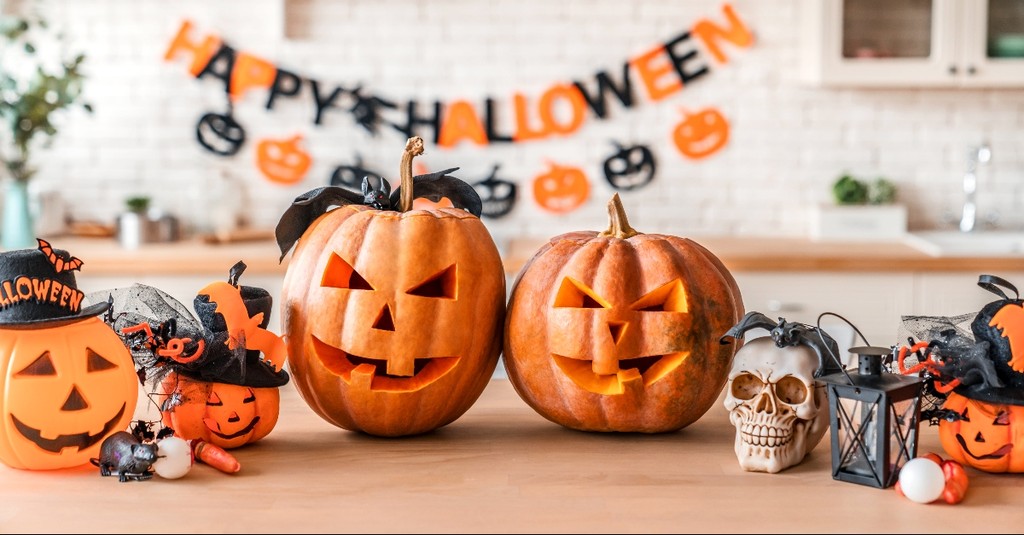
Around this time of year, Halloween always drums up controversy. It doesn’t help that history discussions about how pagan and church traditions each inform the holiday can get complicated. People can’t seem to get the story straight. Some say it started as a Christian tradition that the pagans took over. Others say it’s a pagan tradition that the Christians usurped and that the pagans are slowly taking back.
Other people say it happened as a mixture of the two.
Christians can’t even agree about whether to participate in this holiday.
Some Christians see Halloween as a harmless holiday in which they can either evangelize or allow their kids to get candy.
Some see it as a demonic holiday to be avoided at all costs.
And some strike a middle ground of offering alternatives such as harvest festivals or trunk-or-treat.
So, how do we explain Halloween to our kids if Christians don’t have a consensus?
Further Reading: Is Celebrating Halloween a Sin?
Photo Credit: © iStock/Getty Images Plus/Inside Creative House

What Does the Bible Say about Halloween?
Considering Halloween didn’t become a holiday until long after Scripture became canon, it shouldn’t surprise us that the Bible doesn’t say anything about Halloween. In fact, the Christian version of the holiday, All Saints Day, didn’t appear until the seventh century under Pope Boniface IV.
Many articles have stretched verses beyond their exegetical limit to argue why celebrating Halloween is (or isn’t) okay.
And in truth, if the Bible is silent on one matter, it can be hard to reach a consensus. Christians experience this problem in other areas—for example, it’s difficult to reach a clear consensus on dating because what we call dating didn’t exist in Old or New Testament times.
So, where do we go in gray areas, like how to approach Halloween from a biblical perspective?
We can consider first principles. We can look at articles like “Bible Verses for Halloween” that point to verses that tell us what attitude Christians should have about core issues.
For example, the Bible tells us that we should be wary of the devil, who prowls like a lion (1 Peter 5:8). Some ex-Satanists have warned about forces of darkness lurking about on Halloween. Therefore, we should be aware that dark things may be around, which we may or may not observe.
The Bible also tells us to avoid witches and mediums. Therefore, if we participate in Halloween, we should probably avoid costumes that feature witches or mediums (or demons).
Unfortunately, the Bible doesn’t have a prescriptive answer as to whether or not we could participate in this holiday tradition.
It speaks about being discerning without being ashamed regarding some paganism-related activities. In a letter to the church in Corinth, Paul discusses whether Christians could eat meat used in pagan sacrifices. He startes that we have freedom in Christ, but to remember that not everything permissible is beneficial (1 Corinthians 10:23).
Therefore, I leave the question, “Can you celebrate Halloween with your children?” up to you. I’d throw this into the meat-before-idols category. Some can do it without feeling conviction not to.
Some worry about the spiritual implications.
In all cases, we need grace with one another’s prayerful decisions.
We can apply the same principle to the question, “How should I explain Halloween to my kids?” Not every family will explain it in the same way.
That said, we can offer some suggestions for starting that conversation.
Further Reading: The 10 Christians You Meet on Halloween
Photo Credit: ©Getty Images/BNB Photo

How Should I Explain Halloween to My Kids?
Since not every Christian will agree on Halloween, not every family will explain this holiday tradition the same way. Below, I’ve outlined a few starting points, but I encourage you to prayerfully decide how to best start the conversation based on the family model you have set up.
First Starting Point: The History of the Holiday
For this, I encourage a deep dive into the history of Halloween and All Saints Day. It would surprise you how little people tend to know about the history.
Probably because Samhain spans millennia, and All Saint’s Day happened in the early AD timeline.
As you dive into the traditions, it could be helpful to explain to your children that sometimes church holidays would happen as an alternative to pagan holidays. Or that the reverse would happen. Some pagan holidays appeared in place of church holidays.
Some of the history of the pagan holidays will be a little too scary for littles, so be gentle in how you explain it. Consider how VeggieTales sometimes told tough Bible stories but framed scarier elements, such as murder or adultery, in clever ways that avoided gory elements.
Not only will this help kids better understand the origins, but it may also help steer your decision as to whether or not you celebrate it as a family.
Second Starting Point: Good Overpowering Evil
A really good way to talk about this holiday is to also talk about how we don’t need to fear Satan because we have the power of Jesus.
Whether or not you plan to participate in the holiday, we know that Jesus has significant power over the forces of evil.
You can tell your children that they don’t have to be afraid of this season, or the scary movies that come out, or the scary costumes people dress themselves in. Because we have a good and powerful God.
Third Starting Point: Halloween Alternatives
Let’s say you choose not to participate in Halloween proper but go for one of the alternatives. In that case, explain to your children the alternative and why you’ve chosen to celebrate it.
Purim is a Jewish tradition that comes to mind. During this time, the book of Esther is read, and kids often dress up in costumes.
Explain how your family is doing an alternative holiday—how you still want your kids to have fun in a safe environment.
This could be a great place to draw a parallel if you’ve used alternatives for other things such as TV shows. “We don’t let you watch X, but we do let you watch Y.”
Further Reading: How to Talk to Your Kids about Halloween
Photo Credit: © Getty Images/Alek Zotoff

What’s the Most Important Thing You Can Do for Halloween?
Whether you’ve chosen to participate in the holiday or not, the most important thing you can do is exercise grace this season.
If you have chosen to participate but know of Christians who feel convicted otherwise, don’t chastise them. Don’t try to coerce them into celebrating the holiday or telling them that “they’re making their children miss out on candy and fun.”
With freedom we experience in Christ comes grace. We shouldn’t force anyone to do traditions in which they feel uncomfortable.
On the flip side, I often see a holier-than-thou attitude from the Christians who choose not to participate toward those who do.
One is not any “more Christian” if they choose not to do Halloween.
We must model this grace to our kids as they observe us in our interactions with Christians who differ from us. Constructive conversations can happen in which we share our convictions. It does no one any favors for us to judge each other harshly in those gray areas regarding Scripture.
This season can be hard for Christian families to navigate, as our family traditions may have shifted from those we had in our youth. For instance, we stopped doing Halloween in my childhood, but I do participate in it now.
And I’ve seen the reverse happen—where believers used to do Halloween and have decided not to do so with their families.
Let’s exercise grace and understanding during this time of year.
Further Reading: Halloween: What's a Christian to Do?
Photo Credit: © Getty Images/jenifoto

More Family Resources on Halloween
If you want more advice on how to approach Halloween, you may enjoy these articles:
Can Halloween Be a Fun Holiday for Christians?
10 Horror Novels by Christians for Halloween
A Christian Perspective on Horror in Movies and Culture
10 Scary But Family-Friendly Movies for Halloween
10 Horror Movies with Christian Themes for Halloween
Why Do We Celebrate Fear at Halloween?
6 Teen-Friendly Halloween Movies
Reformation Day And Its Connection To Halloween
10 Spooky Stories in the Bible for Halloween
What's the Difference Between Halloween, All Saints Day and All Souls Day?
Photo Credit: ©Getty Images/jakkapan21
Hope Bolinger is an acquisitions editor at End Game Press, book editor for hire, and the author of almost 30 books. More than 1500 of her works have been featured in various publications. Check out her books at hopebolinger.com for clean books in most genres, great for adults and kids. Check out her editing profile at Reedsy.com to find out about hiring her for your next book project.
Originally published Monday, 25 September 2023.
